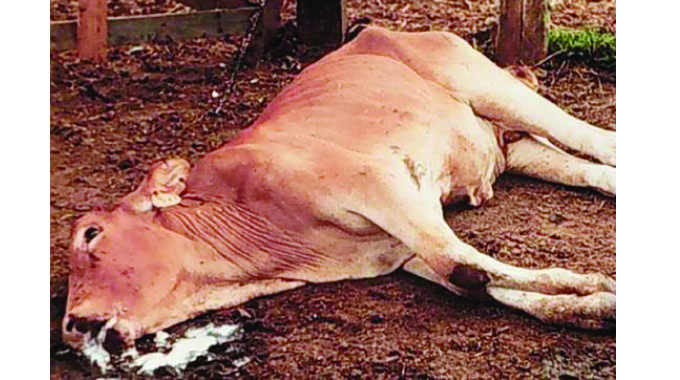Kwekwe farmers fix dip tanks to fight January disease

Michael Magoronga, Midlands Correspondent
FARMERS in Kwekwe District have rolled out a programme to rehabilitate and upgrade dip tanks as part of efforts to ensure that more cattle access dipping services.
This comes as the country is battling to contain tick-borne diseases with January disease, also known as theileriosis, having already claimed a substantial number of cattle in some parts of the country.
Farmers, working together with the Department of Veterinary Services, are reviving dip tanks that are not working and constructing new ones to allow more cattle to dip and reduce deaths.
Speaking during the official handover of Lindale Dip Tank in Sherwood Block just outside Kwekwe, District Veterinary Services Officer, Dr Takundwa Magoba said they are set to rehabilitate more than 10 dip tanks across the district.
“We are working with our farmers to rehabilitate about 10 dip tanks that are dotted around the district. We have more than 100 dip tanks in the district and some of them are not properly functioning hence this move will ensure that farmers do not have to travel long distances to dip their livestock,” she said.
“Only two of our dip tanks out of those 100 are affected by January disease and we have lost a significant number of beasts. We are thus rehabilitating the dip tanks so that more cattle access dipping services.”
Dr Magoba warned farmers against spraying cattle at their pens.
“Dipping is more effective as all parts of the beats get in contact with the vaccine. Unlike spraying at home, not all the parts of the cattle get into contact with the vaccine hence we encourage farmers to dip,” she said.
“These are the cattle that risk spreading the disease to other cattle that will be dipping regularly.”
Lindale Dip Tank was constructed by local farmers with the assistance of the Department of Veterinary Services which provided fencing and poles.
The farmers also mobilised 45 bags of cement and provided manpower.
Lindale Dip Tank chairperson, Mr Robson Chigiji noted that some farmers in the area were not keen on taking their livestock for dipping.
“We are calling upon everyone who has cattle to get their cattle dipped every week because this disease is deadly. Their cattle are a danger to our cattle that dip occasionally,” he said.
He however, said no January disease-related deaths were recorded in the area.
Zibagwe Rural District chief executive officer, Mr Farayi Machaya said: “Cattle symbolise wealth in Zimbabwe if not in Africa, and if they die it is a loss. This January disease should be contained before it wipes off our wealth.”
Mr Machaya said preservation of cattle is in line with the National Development Strategy (NDS1) which speaks of food security.
He said the local authority will create more ‘cattle business centres’ so that farmers are not swindled of their cattle by middle men.

Department of Veterinary Services
“We currently have four cattle business centres in the district. I have observed that we do not have one in Sherwood and I will make sure that we put one so that farmers can benefit fully from their cattle,” he said.
This comes as the Midlands Province has lost several cattle to the disease with Shurugwi being the worst affected.
The Government has declared war on January disease following an upsurge in cases and deaths of livestock across the country.
Several awareness activities have been lined up in collaboration with traditional leaders and other community leaders as part of broader effort to fight the tick-borne disease.

dip tank
Over 400 cattle from four districts in the Midlands province have succumbed to January disease in the first week of the month.
January disease is common between December and March and is spread through the bite of the brown ear tick.
Signs of an animal affected by January disease include swelling of the lymph nodes under the ears and on the shoulder, cloudiness of the eyes and difficulty in breathing with froth from the nose and mouth.
The affected animal collapses and dies within a few days. The hallmark in the control of theileriosis, like all other tick-borne diseases, is to control the tick sector.








Comments